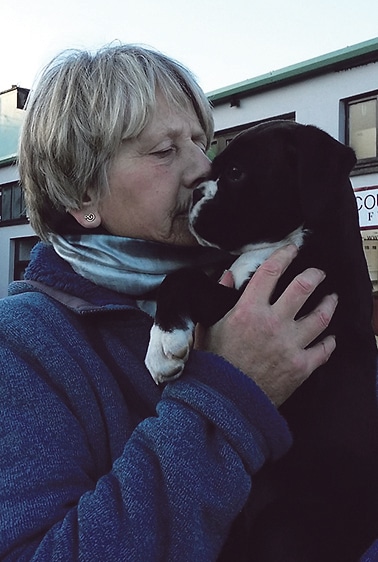
Liz Mahony is an experienced Dog Trainer and Holistic Therapist for all animals. In her monthly column, Liz aims to promote mutual respect between carer and dog. Contact Liz at
corkdogtrainingclasses.com
Finally, lockdown is coming to an end with more and more restrictions being lifted. It’s exciting for people, but I bet your pets aren’t as enthusiastic.
Many people invested in puppies over the past eighteen months because we were all spending time at home. Therefore, the only thing your dogs know is the constant access to you and your attention. If you have been indulging them, then they’re in for a big shock if you never taught them to be alone or amuse themselves without your input.

Did you know that rescue dogs that have been adopted tend to bond with one person in particular, often to the exclusion of anyone else? Not only that, they tend to be overly possessive about that person unless taught otherwise. In moments of honesty we can admit that we rather like being the centre of their attention and feel gratified at their dependency on us. But, realistically, that’s a rather unhealthy relationship. And with lockdown, it’s not just confined to rescue dogs.
Let’s view that relationship in human terms. Would you like someone to be so dependent on you as for it to be virtually impossible to leave him/her? Or you were unable to go off to work without his/her presence beside you. A bit dramatic and cloying, isn’t it? You would long for your own company sometimes and the opportunity to do your own thing ‘alone’! In addition, that person would be incapable of developing his/her own potential.
That’s what happens when we allow our dog to be so dependent that he can’t think or act for himself and suffers anxiety in varying degrees when separated from us. His emotional and psychological growth is severely stunted.
The country is re-opening and we now have the opportunity to travel, go shopping and even return to the workplace either part or full time. For many of us, our dog was a resource to help us get through those tough times of isolation and loneliness. So we invested our emotions in our dogs. There’s absolutely nothing wrong with that, as long as we manage to keep things in perspective.
Talking to friends and family, this lockdown has been much more difficult and stressful than those of last year. This stress has definitely taken its toll on relationships, lifestyle, outlook, everything! But, did you also know that the most stressful situation for dogs is living with us? So, imagine how much more difficult it has been for them. And now, it could seem to them that we are walking out on them. Not that we are consciously doing this but it’s a bit like ‘Now you see me; now you don’t’, as we resume our disrupted lives. However, there are things we can do to ease the transition from constant to intermittent companionship.
If you have a dog who follows you everywhere, even to the bathroom, you need to gently break that habit. Try walking out of the room and closing the door. If there’s someone else left in the room, she has to studiously ignore any manifestation of anxiety. The more we reassure our dog, the more he realises this action gets attention and it turns into a learned behaviour. And many dogs go OTT when the person returns to the room, as though she’s been gone for ages. Every re-appearance should be as low-key as possible.
Putting in a child gate can be a real game changer. The dog can still see you until you walk out of sight and, more importantly, he can’t try to tear the door down in your absence. Once that behaviour starts, it’s but a short step to working himself up to full-blown hysteria, which is distressing for everyone.
Try not to feel guilty about leaving your dog. As long as it’s not for long, it’s actually a necessity for you to go shopping, to work or whatever.
The following are just a few ideas to help:
• You can leave some article of clothing, which carries your scent as a comfort in your absence.
• Get a dog walker, friend or relative to look in, walk the dog or just break the monotony.
• Register with a doggy day care. There are one or two really good ones where you could leave your pet once or twice a week. Most dogs enjoy the stimulation of interaction.
• Come home at lunchtime if that’s feasible.
• Leave interactive toys lying around to amuse him.
Occasionally, it’s a good idea to get a professional to make a home visit to give you advice on how to proceed. Admittedly, separation anxiety is one of the hardest things to erase but not always. A professional will be able to view the whole situation in a pragmatic manner. And, there are essential oils and flower remedies which can really help both owner and pet.


